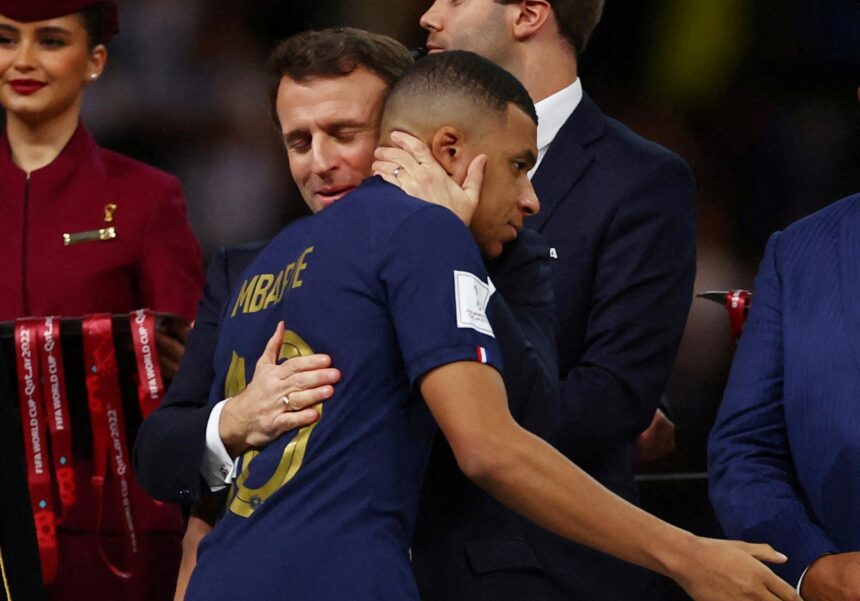The curtain came down on the #Qatar2022 #FIFAWorldCup on Sunday with Argentina lifting the highly-coveted trophy after defeating title holders France on penalties.
Like much of the world, the competition was widely followed in Francophone Africa – the African countries that were colonized by France and where the French language remains an official language.
France maintains deep political, economic, and cultural ties with much of this part of the continent, and is home to the largest diaspora population of Francophone Africa. Those are some of the reasons why players of African descent keep finding their way into the French national team – to the delight of some Africans but it has also been greeted with derision by others.
Many people outside this sphere would expect Les Bleus to enjoy huge support in these countries while in the defence of their World Cup title against La Albiceleste on Sunday.
However, it turned out to be a different story. Argentina’s sky blue colour dwarfed France’s navy blue even before the clash, with solemn prayers pouring for Lionel Messi as opposed to a stream of expletives for Kylian Mbappe.
Facially, it appeared to be for sporting reasons but many pundits and observers see other factors.
“Many people outside our world feel we will always support France national team each time they play against other non-African teams. However, the situation is quite different,” says Kouame Koffi Sylvain, human and social sciences professor at Félix-Houphouët-Boigny University in Abidjan, Cote D’Ivoire.
“In the previous final (2018 Fifa World Cup) when France was slugging it out with Croatia, many people in Francophone Africa rooted for Croatia. This year again, the story was the same. Imagine, half of the France team was composed of players of African origin while there was no black player in Argentina, but they got our support.
“The reason is simple. The anti-French sentiment has been growing is this part of the continent for long, especially amongst the youths, most of whom are football fans. France is often accused of meddling in the internal politics of most of these French-speaking African nations,” he says.
Another point of discord between France and her ex-African colonies is financial. There were banners on the streets of Togo’s capital, Lome, before Sunday’s final, bearing hostile messages for the French team. Some read:
‘France will not get our support until they give us our own currency’, ‘We wish you failures for all the havoc you are causing in Africa,’ ‘Argentina, do us a favour please’.
Kouame continues: “The currency we use, the CFA Franc, is minted in France and controlled by the French treasury. Many finance experts in Francophone Africa claim that such policies have enslaved the region for many years as well as hindering sustainable growth.” The CFA franc was founded in 1945 by France for her then colonies and is currently the legal tender in most of the Francophone countries in West and Central Africa.
However, the support Lionel Messi and Co. enjoyed in this region was not totally due to the hatred for France, some pundits say. Barcelona have a strong fan base in so many of these countries, like Cote D’Ivoire, Senegal, Cameroon, the Congos and Gabon.
“Therefore, we think most of the traditional Barca fans gave their support to Argentina because of Messi even though he no longer plies his trade at Camp Nou,” says Konate Moussa, director of sports programmes at Senegal’s public broadcaster, RTS.
“We should not forget Angel Di Maria also played for Real Madrid, who have a huge fan base here too. However, you could sense the feeling that most people were wishing France all the hard luck. That sentiment stood out. Even women, who don’t usually follow sports, took to the streets to celebrate – not the victory of Argentina but rather the fall of France.”
In Mali, where the current military regime ordered the departure of French troops from the country a few months ago, the support for Argentina was hysterical, according to many pundits, due to growing animosity for Paris.
“It was like Mali won the cup. People were very happy mostly because France didn’t win. Mali has been the epicenter of anti-French sentiments, so it was no surprise that it overflowed into football, which is regrettable though. In all, I believe it will send a strong message to France’s policymakers,” says Ibrahima Konate, a former football coach based in Bamako, Mali.
But others argue that the French team do not deserve such treatment from Africans considering the opportunities many aspiring African footballers have received in that country.
“I wish the anti-French sentiment was restricted to sociopolitical issues and not sports. No other European country has accommodated African players like France, which is home to the highest number of African professionals in Europe – the stats show. Many top African players used France as a launch pad for their carriers,” says Alexandre Ananou, a football club owner in Togo.
“No other European national team grants access to players of African descent than France. If you put all these into perspective, you seem to realize that French football deserves some respect in Africa, irrespective of the political tensions.”
Is it safe to say many people in the region rightly expressed their feelings on Sunday but with little regard for Fifa’s crusade against politics into football?









